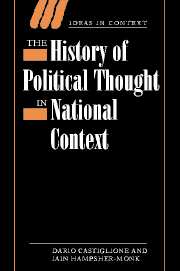Book contents
- Frontmatter
- Contents
- List of contributors
- Preface
- 1 Introduction The history of political thought and the national discourses of politics
- 2 The voice of the ‘Greeks’ in the conversation of mankind
- 3 History of political theory in the Federal Republic of Germany: strange death and slow recovery
- 4 A German version of the ‘linguistic turn’: Reinhart Koselleck and the history of political and social concepts (Begriffsgeschichte)
- 5 One hundred years of the history of political thought in Italy
- 6 Discordant voices: American histories of political thought
- 7 The professoriate of political thought in England since 1914: a tale of three chairs
- 8 The history of political thought and the political history of thought
- 9 The rise of, challenge to and prospects for a Collingwoodian approach to the history of political thought
- 10 Towards a philosophical history of the political
- 11 ‘Le retour des émigrés’? The study of the history of political ideas in contemporary France
- 12 National political cultures and regime changes in Eastern and Central Europe
- 13 The limits of the national paradigm in the study of political thought: the case of Karl Popper and Central European cosmopolitanism
- 14 Postscript. Disciplines, canons and publics: the history of ‘the history of political thought’ in comparative perspective
- Index
- IDEAS IN CONTEXT
6 - Discordant voices: American histories of political thought
Published online by Cambridge University Press: 23 September 2009
- Frontmatter
- Contents
- List of contributors
- Preface
- 1 Introduction The history of political thought and the national discourses of politics
- 2 The voice of the ‘Greeks’ in the conversation of mankind
- 3 History of political theory in the Federal Republic of Germany: strange death and slow recovery
- 4 A German version of the ‘linguistic turn’: Reinhart Koselleck and the history of political and social concepts (Begriffsgeschichte)
- 5 One hundred years of the history of political thought in Italy
- 6 Discordant voices: American histories of political thought
- 7 The professoriate of political thought in England since 1914: a tale of three chairs
- 8 The history of political thought and the political history of thought
- 9 The rise of, challenge to and prospects for a Collingwoodian approach to the history of political thought
- 10 Towards a philosophical history of the political
- 11 ‘Le retour des émigrés’? The study of the history of political ideas in contemporary France
- 12 National political cultures and regime changes in Eastern and Central Europe
- 13 The limits of the national paradigm in the study of political thought: the case of Karl Popper and Central European cosmopolitanism
- 14 Postscript. Disciplines, canons and publics: the history of ‘the history of political thought’ in comparative perspective
- Index
- IDEAS IN CONTEXT
Summary
To survey the varied array of approaches to the history of political thought in the United States since the Second World War is too tall an order to fill in a single chapter. So I shall simply highlight a number of topics, themes, approaches and ‘schools’ that have been variously in vogue over the past half-century or so, illustrating each with especially noteworthy examples. I shall begin by considering the institutional site in which American historians of political thought typically work – namely, departments of political science – and how this has affected the approaches they adopt. I then consider a number of defining themes and moments, both inside and outside the American academy. Outside, the threats of fascist and communist totalitarianism, the Holocaust and the Cold War, the ‘end of ideology’ debate, the Vietnam War and the rise of the New Left, the black and women's liberation movements, and a resurgent conservatism; inside, the profound impact of European, and especially German-Jewish, émigrés, McCarthyism and the loyalty oath controversies, the ‘behavioural revolution’ in political science, the rise of positivism, the anti-behaviouralist and anti-positivist backlash, and the emergence of feminism, multiculturalism, postmodernism, and other influential perspectives.
As an academic subject, the history of political thought is typically studied in departments of political science, where it is classified under the larger heading of political theory – or, as the American Political Science Association designates it, ‘Political Theory: Normative and Historical’. This designation separates and segregates this sort of political theory from ‘Political Theory: Empirical and Analytic’.
- Type
- Chapter
- Information
- The History of Political Thought in National Context , pp. 107 - 133Publisher: Cambridge University PressPrint publication year: 2001
- 20
- Cited by

